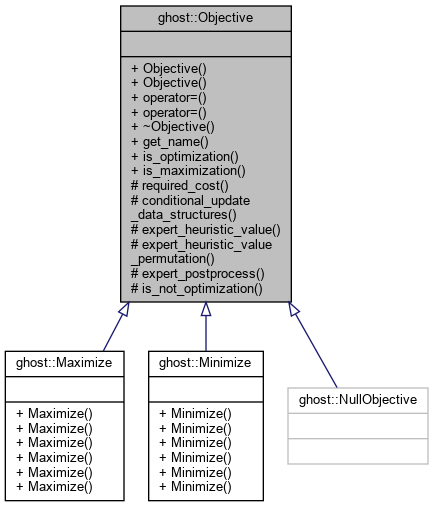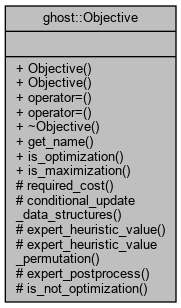#include <objective.hpp>


Public Member Functions | |
| Objective (const Objective &other)=default | |
| Default copy contructor. | |
| Objective (Objective &&other)=default | |
| Default move contructor. | |
| Objective & | operator= (const Objective &other)=delete |
| Copy assignment operator disabled. | |
| Objective & | operator= (Objective &&other)=delete |
| Move assignment operator disabled. | |
| virtual | ~Objective ()=default |
| Default virtual destructor. | |
| std::string | get_name () const |
| Inline accessor to get the name of the objective object. | |
| bool | is_optimization () const |
| Inline method returning if a user-defined objective function has been declared. | |
| bool | is_maximization () const |
Protected Member Functions | |
| virtual double | required_cost (const std::vector< Variable * > &variables) const =0 |
| virtual void | conditional_update_data_structures (const std::vector< Variable * > &variables, int index, int new_value) |
| virtual int | expert_heuristic_value (const std::vector< Variable * > &variables, int variable_index, const std::vector< int > &possible_values, randutils::mt19937_rng &rng) const |
| virtual int | expert_heuristic_value_permutation (const std::vector< Variable * > &variables, int variable_index, const std::vector< int > &bad_variables, randutils::mt19937_rng &rng) const |
| virtual double | expert_postprocess (const std::vector< Variable * > &variables, double best_cost) const |
| void | is_not_optimization () |
Detailed Description
This is the base class containing the logic of objective functions. However, users would not derive their own Objective class directly from ghost::Objective, but from one of the two derived class ghost::Minimize and ghost::Maximize.
This class contains some methods prefixed by 'expert_'. It is highly recommended that users override such methods only if they know what they are doing.
- See also
- Variable
Constructor & Destructor Documentation
◆ Objective() [1/2]
|
default |
Default copy contructor.
◆ Objective() [2/2]
|
default |
Default move contructor.
◆ ~Objective()
|
virtualdefault |
Default virtual destructor.
Member Function Documentation
◆ conditional_update_data_structures()
|
protectedvirtual |
Update user-defined data structures in the objective function.
Like any methods prefixed by 'conditional_', this method must be overriden under some conditions: if some inner data structures are defined in derived objective classes and need to be updated while variable values change (i.e., when the solver asssign 'new_value' to variables[index]), this method must be implemented to define how data structures must be updated.
- Parameters
-
variables a const reference of the vector of raw pointers to variables of the objective function. index an integer to get the variable 'variables[index]' that has been updated by the solver. new_value an integer to know what is the new value of 'variables[index]'.
◆ expert_heuristic_value()
|
protectedvirtual |
Virtual method to apply the value heuristic used by the solver for non permutation problems.
While dealing with non permutation problems, the solver calls this method to apply an eventual user-defined heuristic to choose a new domain value for a variable selected by the solver.
The default implementation outputs the value leading to the lowest objective cost. If two or more values lead to configurations with the same lowest cost, one of them is randomly returned.
Like any methods prefixed by 'expert_', users should override this method only if they know what they are doing.
- Parameters
-
variables a const reference of the vector of raw pointers of variables in the scope of the objective function. The solver is calling this method with the vector of variables that has been given to the constructor. variable_index the index of the variable to change in the vector Objective::_variables. possible_values a const reference to the vector of possible values of the variable to change. rng a neat random generator implemented in thirdparty/randutils.hpp, see https://www.pcg-random.org/posts/ease-of-use-without-loss-of-power.html
- Returns
- The selected value according to the heuristic.
◆ expert_heuristic_value_permutation()
|
protectedvirtual |
Virtual method to apply the value heuristic used by the solver for permutation problems.
While dealing with permutation problems, the solver calls this method to apply an eventual user-defined heuristic to choose a variable to swap the value with.
By default, it returns a random variable from the bad_variables vector given as input.
Like any methods prefixed by 'expert_', users should override this method only if they know what they are doing.
- Parameters
-
variables a const reference of the vector of raw pointers of variables in the scope of the objective function. The solver is calling this method with the vector of variables that has been given to the constructor. variable_index the index of the variable to change in the vector Objective::_variables. bad_variables a const reference to the vector of candidate variables the solver may swap the value with. rng a neat random generator implemented in thirdparty/randutils.hpp, see https://www.pcg-random.org/posts/ease-of-use-without-loss-of-power.html
- Returns
- The index of the selected variable to swap with, according to the heuristic.
◆ expert_postprocess()
|
protectedvirtual |
Virtual method to perform post-processing optimization.
This method is called by the solver once it has found a solution. Its purpose is to apply human-knowledge optimization.
By default, it simply returns best_cost given as input, without modifying the variables. Users need to override it to have their own post-processing optimization.
Like any methods prefixed by 'expert_', users should override this method only if they know what they are doing.
- Warning
- The computation spantime of this method is not taken into account by timeouts given to the solver. If users override this method, they must ensure its computation time is neglictable compare to the timeout giving as input to Solver::solve.
- Parameters
-
variables a const reference of the vector of raw pointers of variables in the scope of the objective function. The solver is calling this method with the vector of variables that has been given to the constructor. If users must change some variables values, they must do it on variables from this vector, otherwise the modified solution won't be taken into account by the solver. best_cost a double representing the best optimization cost found by the solver so far. This helps users be sure that their post-processing leads to actual improvements.
- Returns
- The new error after post-processing.
◆ get_name()
|
inline |
Inline accessor to get the name of the objective object.
◆ is_maximization()
|
inline |
Inline method if the user-defined objective function has to be maximized (true) or minimize (false).
◆ is_not_optimization()
|
inlineprotected |
◆ is_optimization()
|
inline |
Inline method returning if a user-defined objective function has been declared.
◆ operator=() [1/2]
Copy assignment operator disabled.
◆ operator=() [2/2]
Move assignment operator disabled.
◆ required_cost()
|
protectedpure virtual |
Pure virtual method to compute the value of the objective function regarding the values of variables given as input.
Like Constraint::required_error, this method is fundamental: it evalutes the performance of the current values of the variables. GHOST will search for variable values that will minimize or maximize the output of this method.
Like any methods prefixed by 'required_', overriding this method is mandatory.
- Parameters
-
variables a const reference of the vector of raw pointers to variables in the scope of the constraint. The solver is actually calling this method with the vector of variables that has been given to the constructor.
- Returns
- A double corresponding to the value of the objective function on the current configuration. Unlike Constraint::required_error, this output may be negative.
- Exceptions
-
Throws an exception if the computed value is NaN.
The documentation for this class was generated from the following file: